International politics
Aspects related to European policies, international civil service, consultancy, social and humanitarian action, culture and the environment.
Enrolment open
8 a.m. to 2 p.m.
Blanquerna-URL - Plaça Joan Coromines. 08001 Barcelona
School of Communication and International Relations
The Blanquerna School of Communication and International Relations promotes the bachelor's degree in International Relations to respond to the growing demand for professionals specializing in international affairs in the public sector, the private sector, multilateral organizations, non-governmental organizations, foundations, think tanks and the communication sector.
We train professionals and researchers in international relations in order to work in the foreign political, economic, cultural and communication sectors of governments, multilateral organizations, multinational corporations and business internationalization projects, in addition to in development cooperation organizations.
The bachelor's degree in International Relations prepares students with the knowledge and professional skills to undertake and manage projects in the area of international relations.
International affairs.
Multilateral organizations.
Non-governmental organizations.
Foundations.
Think tanks.
Communication sector.
A guaranteed future career.
In the ranking of fields of knowledge, which assesses public and private universities, URL is ranked as the number one university in Spain for Journalism and Communication, and the third Catalan university in the field of Political Science (Bachelor's Degree in International Relations). These two subjects are taught by the Blanquerna-URL School of Communication and International Relations. Furthermore, for the third consecutive year, Ramon Llull University stands out in the area of international orientation, with all indicators evaluated as maximum performance, in other words, above the average for universities.

In the Bachelor's Degree in International Relations, students can personalize their own itinerary through elective courses, in this way, they can profile themselves in areas assigned to:
Aspects related to European policies, international civil service, consultancy, social and humanitarian action, culture and the environment.
Aspects related to the international private sector and development cooperation.
Geared towards public affairs, international corporate communication, marketing and market consulting and international events.
employment rate (School overall, AQU data)
agreements with companies
international university agreements
taught in English
The Blanquerna methodology is based on seminars, a core element in achieving personalized and qualitative learning and holistic training that includes not only academic and professional competencies but also personal and human skills.
With a focus on subjects with a theoretical component, master classes are taught by professionals and experts in a particular field, who offer guidance and support to their tutees in their particular disciplines, and build an ongoing academic and personal development relationship.
Seminar tutors work 6 hours a week with a maximum of 12 students. This establishes a relationship of trust between tutor and tutee and allows the monitoring of each tutees' progress. These sessions also help students to see the connections between what they are studying and their future professional careers.
We have agreements with leading multinational companies in the country, as well as private companies, and internal and external communication, business, marketing and public relations departments. The School has an agreement with more than 1,200 companies.
Studying abroad is a life-changing experience. We offer you the opportunity to take part in various exchange programs and internships abroad, as well as to participate in a variety of international cooperation programs.
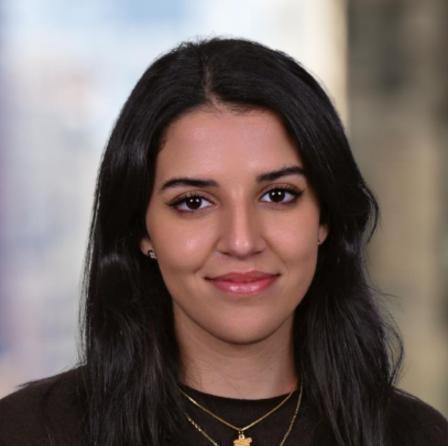
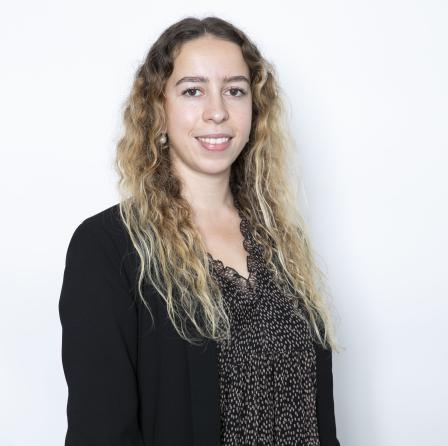
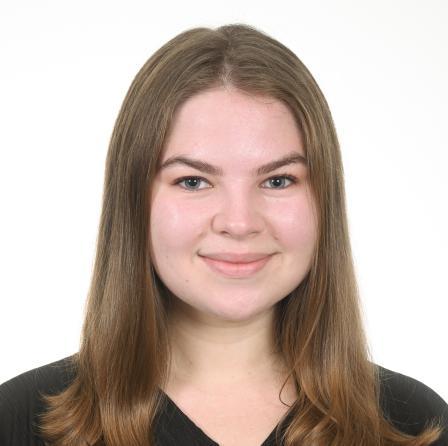
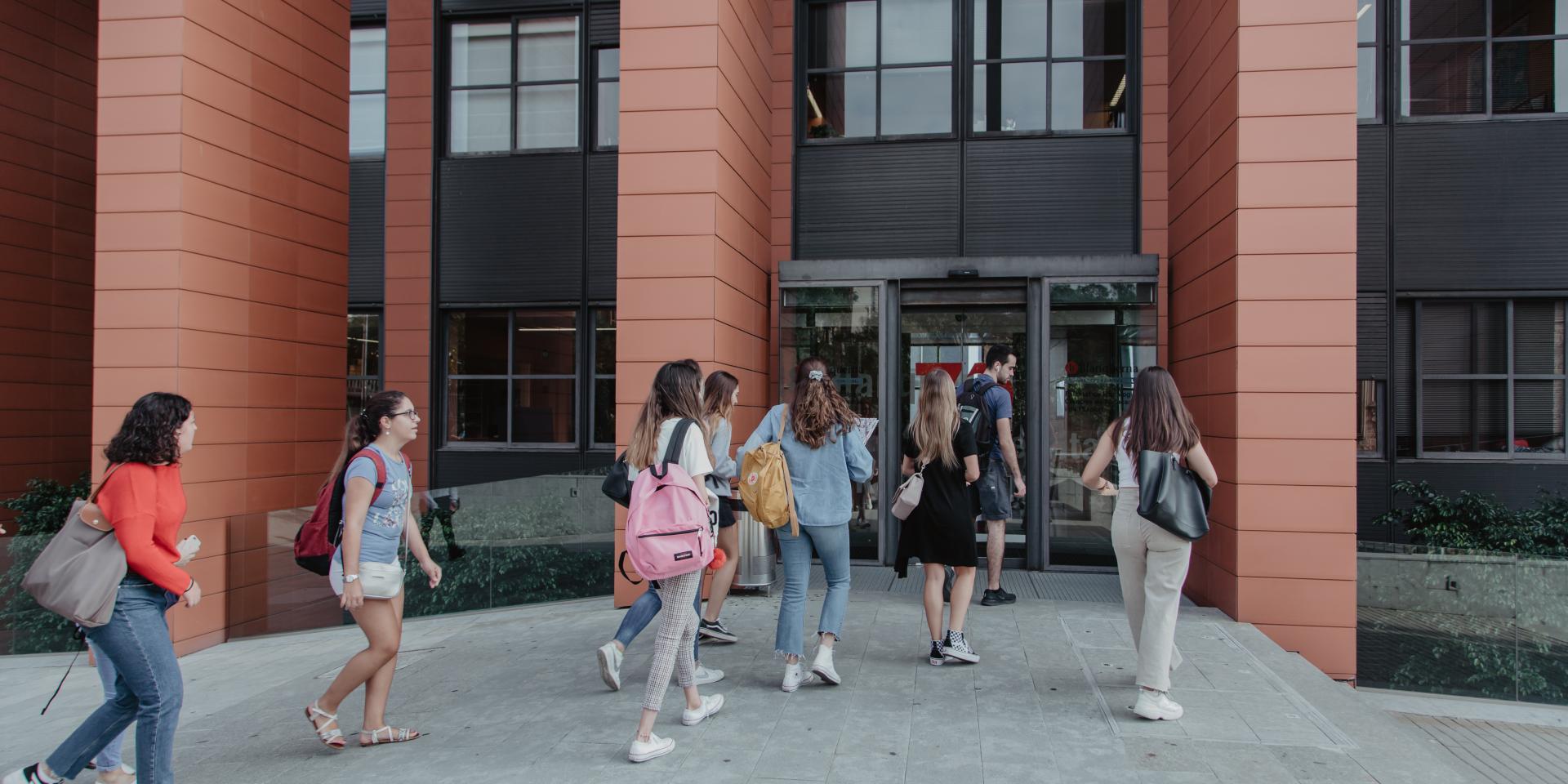
Study for two majors simultaneously, consecutively or following a track tailored to you
News
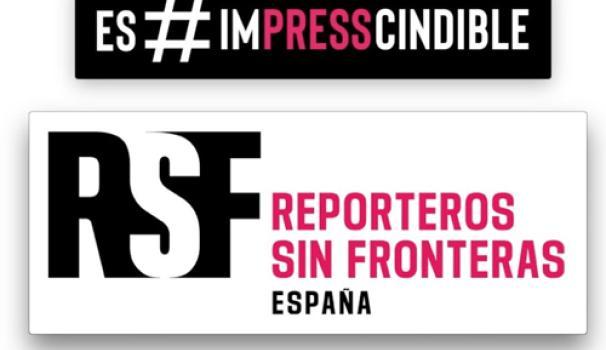
June 29, 2021
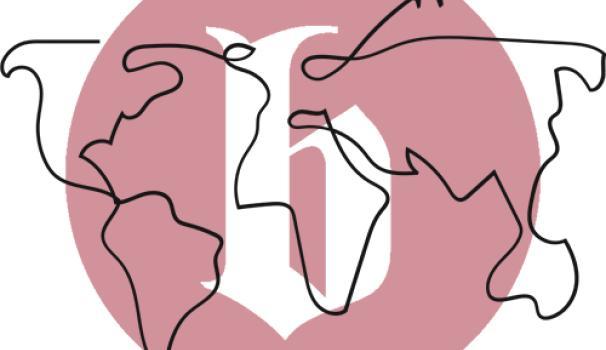
June 1, 2021
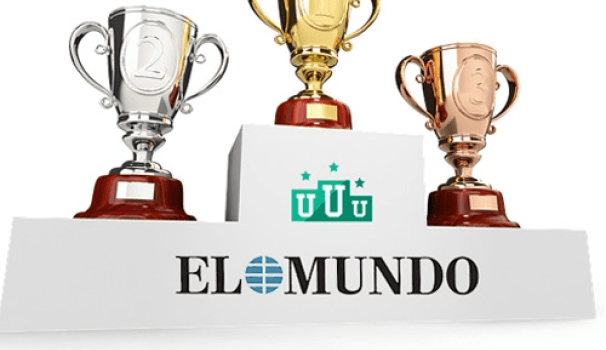
May 12, 2021
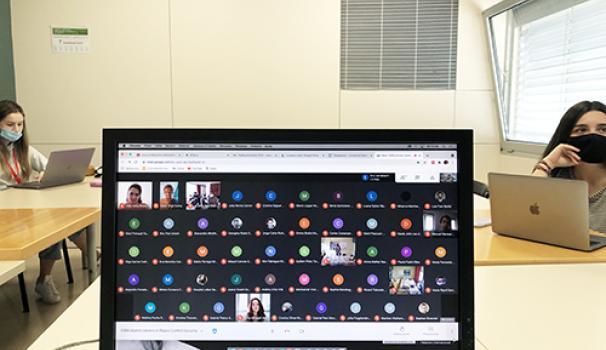
May 7, 2021

Blanquerna is a university with an international vision. Every year, we welcome students from all over the world wishing to study a full bachelor degree at our center. You could be among them.

The Curriculum for the bachelor's degree in International Relations is made up of basic, compulsory, and elective courses, internships, and a bachelor's thesis divided into 8 semesters (4 years) from September to May. Within this plan, you will be able to choose the different languages you will want to learn (Arabic, Chinese or French), the area-specialization seminars, and the various electives courses according to the professional profile you want to specialize in. You can see it in detail below:
| First | Second | Third | Fourth | Total | |||
| Final degree project | 12 | 12 | |||||
| Core curriculum | 46 | 24 | 70 | ||||
| Internships | 8 | 8 | |||||
| Compulsory | 14 | 36 | 48 | 34 | 132 | ||
| Optional | 12 | 6 | 18 | ||||
| Total | 60 | 60 | 60 | 60 | 240 |
| Subject | Credits | Academic type | |
| First semester | |||
| Language I: English for I.R. 1 | 4 | Compulsory | |
| Political Philosophy | 6 | Core curriculum | |
| Fundamentals of History | 6 | Core curriculum | |
| Introduction to Economics | 6 | Core curriculum | |
| Seminar I: Methodology & Linguistic Expression | 8 | Core curriculum | |
| Second semester | |||
| Language II: English for I.R. 2 | 4 | Compulsory | |
| Contemporary History | 6 | Core curriculum | |
| Introduction to Law | 6 | Core curriculum | |
| Seminar II: International Current Events | 8 | Core curriculum | |
| Introduction to Political Science | 6 | Compulsory | |
| Subject | Credits | Academic type | |
| Third semester | |||
| Language III: English for I.R. 3 | 4 | Compulsory | |
| International Public Law | 6 | Core curriculum | |
| International Political Economy | 6 | Core curriculum | |
| History of I.R. | 6 | Core curriculum | |
| Seminar III: Introduction to I.R. | 8 | Compulsory | |
| Fourth semester | |||
| Language IV | 4 | Optional | |
| Language IV: Arabic 1 | |||
| Language IV. French 1 | |||
| International Commerce | 6 | Core curriculum | |
| International Political Structure | 6 | Compulsory | |
| Seminar IV: Conflict Analysis | 8 | Compulsory | |
| Theory of I.R. | 6 | Compulsory | |
| Subject | Credits | Academic type | |
| Seventh semester | |||
| Practicum | 8 | Practicum | |
| Seminar VII: Internship Follow-up | 4 | Compulsory | |
| Human Rights | 6 | Compulsory | |
| Geopolitics | 3 | Compulsory | |
| Global Governance | 3 | Compulsory | |
| Negotiation, Advocacy and Lobbying | 6 | Compulsory | |
| Eighth semester | |||
| Language VII | 4 | Optional | |
| Language VII. Arabic 4 | |||
| Language VII. French 4 | |||
| Final Degree Project | 12 | Final degree project | |
| Seminar VIII: Development of Projects | 8 | Compulsory | |
| Specialization itinerary: International Communication | |||
| Transnational Communication Management | 3 | Optional | |
| Internet and Global Society | 3 | Optional | |
| Specialization itinerary: International Economy & Development | |||
| International Economic Integration and EU Economics | 3 | Optional | |
| Internet and Global Society | 3 | Optional | |
| Specialization itinerary: Foreign Policy & EU | |||
| Internet and Global Society | 3 | Optional | |
| EU Foreign Policy | 3 | Optional | |
| First | Second | Third | Fourth | Total | |||
| Final degree project | 8 | 8 | |||||
| Core curriculum | 44 | 18 | 62 | ||||
| Internships | 12 | 12 | |||||
| Compulsory | 16 | 42 | 33 | 28 | 119 | ||
| Optional | 27 | 12 | 39 | ||||
| Total | 60 | 60 | 60 | 60 | 240 |
| Subject | Credits | Academic type | |
| First semester | |||
| Essentials of Economics | 6 | Core curriculum | |
| Political Philosophy | 6 | Core curriculum | |
| Contemporary World History | 6 | Core curriculum | |
| Seminar I: Communication Skills and International current events | 8 | Core curriculum | |
| Language I, 1* | 4 | ||
| Language I: English for I.R. 1 | |||
| Language I. Spanish for I.R. 1 | |||
| Second semester | |||
| Sociology | 6 | Core curriculum | |
| International Law | 6 | Core curriculum | |
| Political Science | 6 | Core curriculum | |
| Seminar II: The Actors of International Relations | 8 | Compulsory | |
| Language I, 2. * | 4 | Compulsory | |
| Language II: English for I.R. 2 | |||
| Language II. Spanish for I.R. 2 | |||
| *Spanish will be offered as a modern language option only if there are enough students enrolled to form a group. | |||
| Subject | Credits | Academic type | |
| Third semester | |||
| Theories of International Relations | 6 | Compulsory | |
| The European Union | 6 | Compulsory | |
| International Political Structure | 6 | Compulsory | |
| Seminar III: Conflict Analysis | 8 | Compulsory | |
| Language I, 3. * | 4 | Compulsory | |
| Language III: English for I.R. 3 | |||
| Language III: Spanish for I.R. 3 | |||
| Fourth semester | |||
| Seminar IV: Geopolitics | 8 | Compulsory | |
| Global Political Economy | 6 | Core curriculum | |
| Foreign Policy | 6 | Core curriculum | |
| Research Techniques and Statistics | 6 | Core curriculum | |
| Language II, 1. Once a language track has been chosen, this decision cannot be changed.* | 4 | Compulsory | |
| Language IV: Arabic 1 | |||
| Language IV. French 1 | |||
| Language IV. Chinese 1 | |||
| *Spanish will be offered as a modern language option only if there are enough students enrolled to form a group. | |||
| *Chinese will be offered as a modern language option only if there are enough students enrolled to form a group. |
| Subject | Credits | Academic type | |
| Seventh semester | |||
| Lobby and Advocacy | 3 | Compulsory | |
| Project Management & International Tenders | 3 | Compulsory | |
| Negotiation & Leadership | 3 | Compulsory | |
| Global Intelligence | 3 | Compulsory | |
| Seminar VII: Internship Follow-Up | 4 | Compulsory | |
| Professional Internships | 12 | Practicum | |
| Eighth semester | |||
| Seminar VIII: Academic Project Development | 8 | Compulsory | |
| Final Degree Project | 8 | Final degree project | |
| Language II, 4. Once a language track has been chosen, this decision cannot be changed.* | 4 | Compulsory | |
| Language VII. Arabic 4 | |||
| Language VII. French 4 | |||
| Language VII. Chinese 4 | |||
| A Optional 10. Select one subject not previously taken | 3 | Optional | |
| Development Economics and International Development Cooperation System | |||
| Foreign Policy of Great Powers | |||
| International Relations and Big Data | |||
| A Optional 11. Select one subject not previously taken | 3 | Optional | |
| Diplomacy | |||
| Regional Economic Integration and EU Economics | |||
| Marketing | |||
| A Optional 12. Select one subject not previously taken | 3 | Optional | |
| International Business | |||
| Environmental Sustainability and Climate Change | |||
| A Optional 13. Select one subject not previously taken | 3 | Optional | |
| International Business | |||
| EU Foreign Policy | |||
| *Chinese will be offered as a modern language option only if there are enough students enrolled to form a group. |
| First | Second | Third | Fourth | Total | |||
| Final degree project | 8 | 8 | |||||
| Core curriculum | 44 | 18 | 62 | ||||
| Internships | 12 | 12 | |||||
| Compulsory | 16 | 42 | 33 | 28 | 119 | ||
| Optional | 27 | 12 | 39 | ||||
| Total | 60 | 60 | 60 | 60 | 240 |
| Subject | |||
| First semester | |||
| Seminar I: Communication Skills and International current events | 8 | Core curriculum | |
| Contemporary World History | 6 | Core curriculum | |
| Essentials of Economics | 6 | Core curriculum | |
| Political Philosophy | 6 | Core curriculum | |
| Language I, 1.* | 4 | Compulsory | |
| Language I: English for I.R. 1 | |||
| Language I. Spanish for I.R. 1 | |||
| Second semester | |||
| Seminar II: The Actors of International Relations | 8 | Compulsory | |
| International Law | 6 | Core curriculum | |
| Sociology | 6 | Core curriculum | |
| Political Science | 6 | Core curriculum | |
| Language I, 2.* | 4 | Compulsory | |
| Language II: English for I.R. 2 | |||
| Language II. Spanish for I.R. 2 | |||
| *Spanish will be offered as a modern language option only if there are enough students enrolled to form a group. |
| Subject | |||
| Third semester | |||
| Seminar III: Conflict Analysis | 8 | Compulsory | |
| Theories of International Relations | 6 | Compulsory | |
| International Political Structure | 6 | Compulsory | |
| The European Union and European Affairs | 6 | Compulsory | |
| Language I, 3.* | 4 | Compulsory | |
| Language III: English for I.R. 3 | |||
| Language III: Spanish for I.R. 3 | |||
| *Spanish will be offered as a modern language option only if there are enough students enrolled to form a group. | |||
| Fourth semester | |||
| Seminar IV: Geopolitics | 8 | Compulsory | |
| Global Political Economy | 6 | Core curriculum | |
| Foreign Policy | 6 | Core curriculum | |
| Qualitative and Quantitative Research Techniques | 6 | Core curriculum | |
| Language II, 1. Once a language track has been chosen, this decision cannot be changed. | 4 | Compulsory | |
| Language IV: Arabic 1 | |||
| Language IV. French 1 |
| Subject | |||
| Fifth semester | |||
| Human Rights and Ethics | 6 | Compulsory | |
| Seminar V: Regional Studies I | 8 | Compulsory | |
| Language II, 2. Once a language track has been chosen, this decision cannot be changed. | 4 | Compulsory | |
| Language V: Arabic2 | |||
| Language V. French 2 | |||
| Option 1. Select one subject | |||
| International Trade and Finances | 3 | Optional | |
| Peace and Security | 3 | Optional | |
| Option 2. Select one subject | |||
| Democracy and Democratization Processes | 3 | Optional | |
| Theories of Communication | 3 | Optional | |
| Option 3. Select one subject | |||
| Gender and International Relations | 3 | Optional | |
| Global Society and Technology | 3 | Optional | |
| Option 4. Select one subject | |||
| Communication Management in Public Affairs | 3 | Optional | |
| Global Governance and Religions | 3 | Optional | |
| Sixth semester | |||
| Seminar VI: Regional Studies II | 8 | Compulsory | |
| Applied Methodology for Projects | 3 | Compulsory | |
| Language II, 3. Once a language track has been chosen, this decision cannot be changed. | 4 | Compulsory | |
| Language VI. Arabic 3 | |||
| Language VI. French 3 | |||
| Option 5. Select one subject | |||
| Development Economics and International Development Cooperation System | 3 | Optional | |
| Foreign Policy of Great Powers | 3 | Optional | |
| International Relations, Big Data and Artificial Intelligence | 3 | Optional | |
| Option 6. Select one subject | |||
| Diplomacy | 3 | Optional | |
| Marketing | 3 | Optional | |
| Regional Economic Integration and EU Economics | 3 | Optional | |
| Option 7. Select one subject | |||
| Cultural Diversity | 3 | Optional | |
| Environmental Sustainability and Climate Change | 3 | Optional | |
| Option 8. Select one subject | |||
| Migration & Demographic Trends | 3 | Optional | |
| International Business | 3 | Optional | |
| Option 9. Select one subject | |||
| EU Law | 3 | Optional | |
| EU Foreign Policy | 3 | Optional |
Course fees are paid in installments without any interest. At the time of enrollment, 50% of the total cost of the credits for which the student is enrolled must be paid*; the remaining 50% is split into nine monthly installments (from October to June) payable by direct debit.
The tuition fee / credit of degrees is regularized each academic year for all courses.
Fundació Blanquerna discounts (not cumulative with each other):
In order to apply the discount, you must prove it with the corresponding document. Students must bring the original document in person to the Academic Secretariat, together with their identification document, for validation and application of the corresponding discount.
The deadline for submitting the supporting documentation for the 2026-2027 academic year is September 30, 2026.
The degree in International Relations has a broad career path, with a very diverse range of job opportunities.

Diplomacy, policy-making and international agreements, peace and security, conflict management, human rights and international law, humanitarian aid, development policy, education policy, health policy, environmental sustainability, migration and refugees, trade and finance.

Management consultant, strategy consultant, internationalization consultant, export manager.

Global communications director, grant writer, program coordinator, program manager, development and fundraising manager.
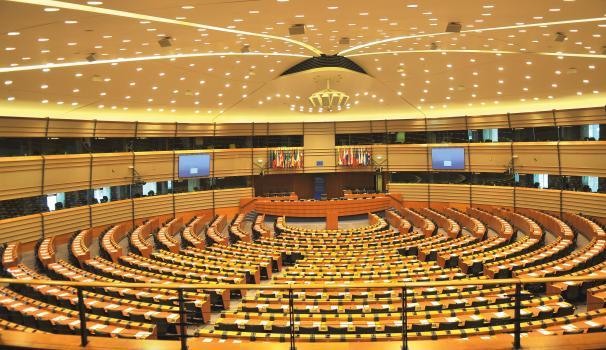
Corporate communications, non-profit communications specialist, lobbyist, journalist, global communicator, public and institutional relations.

Intelligence specialist, political analyst, risk analyst, political consultant, policy analyst, researcher in international security and cybersecurity.
University professor, lifelong learning trainer.
A report on best practices in International Relations bachelor's degrees based on an analysis of 800 North American university programs, published by the Association of Professional Schools of International Affairs in 2017, forecast a 21% increase in jobs associated with international relations bachelor's degrees, stating that international relations students and alumni were better prepared to enter the global job market.
This curriculum in international relations responds to these challenges and, therefore, its educational content is committed to a multilingual and interdisciplinary nature, knowledge appropriate to the current challenges, and the professional competencies required by the international labor market. Of the 10 most required skills in the labor market in 2025 identified by the World Economic Forum study, international relations students develop at least 7: analytical thinking and innovation, complex problem solving, critical thinking and analysis, creativity, originality and initiative, reasoning, problem solving and ideation, active learning and learning strategies, and resilience, stress tolerance and flexibility.
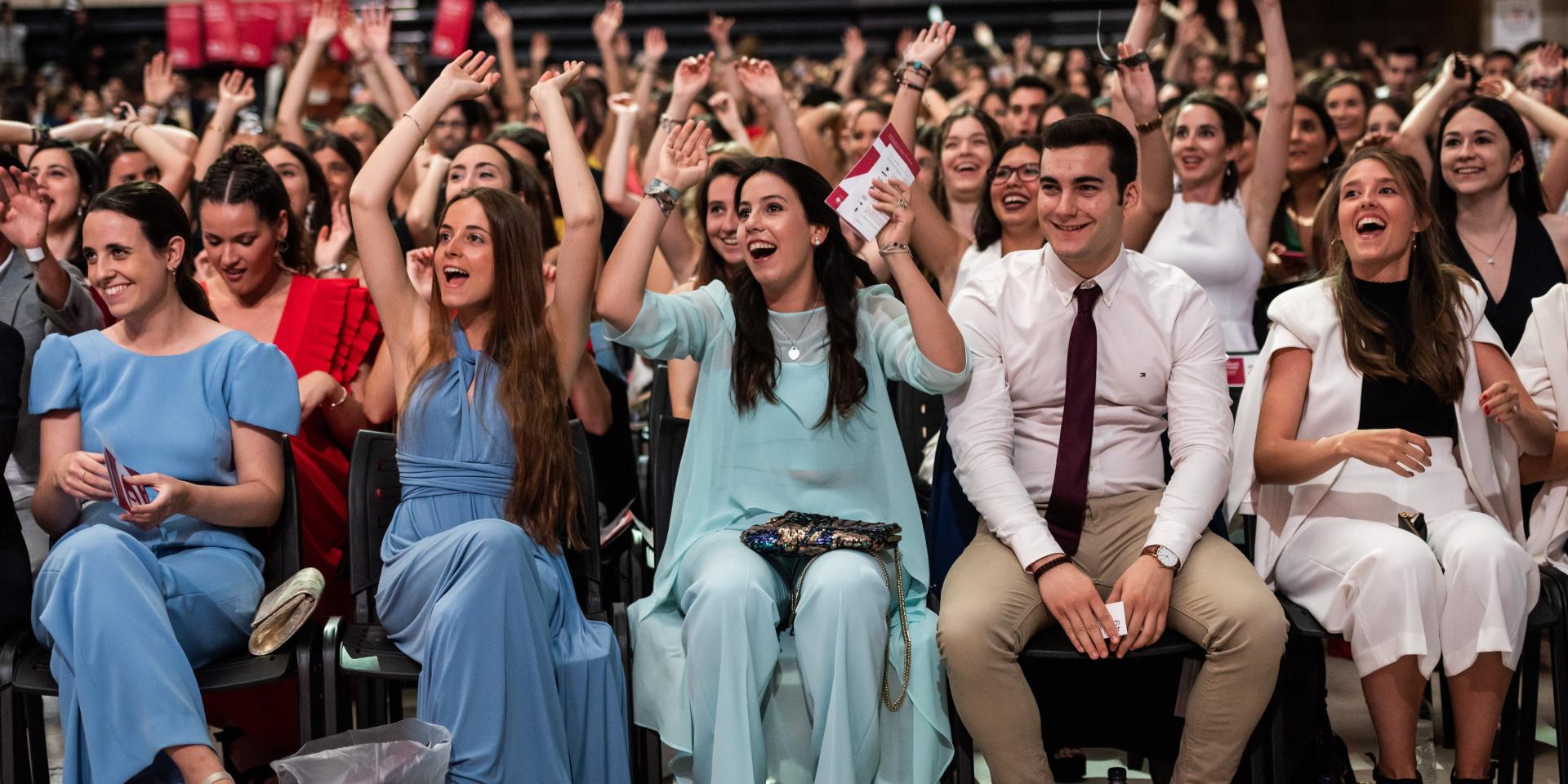
Our work doesn't finish the moment you graduate. The Alumni department will support you to enable us to achieve an employment rate of 90% of students in the first year after graduation
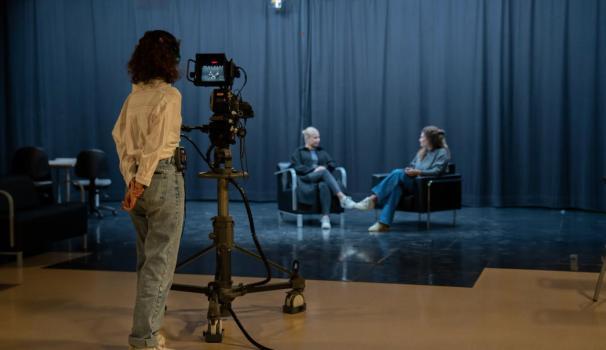
In front of or behind the camera? You can work on any of these skills in the school's two television studios. In addition to the cameras, you can learn how the production room, the lighting and the teleprompter work.
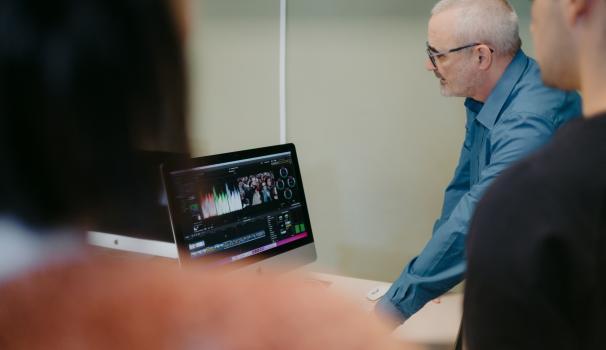
Available for both academic work and personal projects, you will find a total of 9 audio and video post-production rooms at the school, equipped with pioneering programs such as Photoshop, DaVinci Resolve, Final Cut Pro, Premiere Pro, After Effects and Audition.
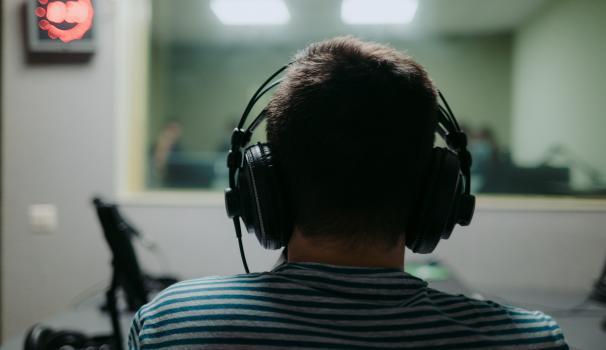
Whether it's broadcasting live or recording a podcast, you'll find all the equipment you need to do radio. The school has two radio studios and three individual workspaces equipped with microphones and telephones for external interviews.
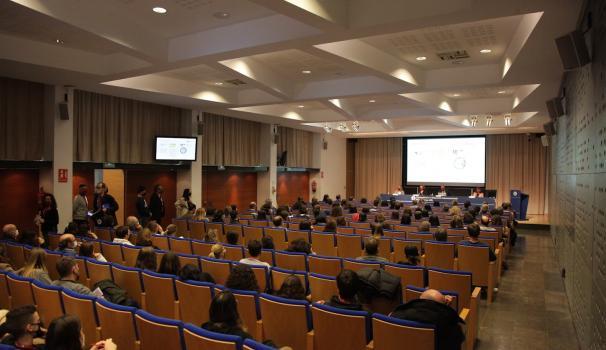
The school has an auditorium that can be used for celebrations, academic events, conferences or activities. In addition to the school's events, the space hosts other occasions that require ample space.
If you have a job or just need a computer, you can go to the computer classrooms or workspaces and use the Macs we have at your disposal.
Going into the world of work having been able to use professional equipment is essential. That's why we provide you with cameras that are used in the Audiovisual Communication and Journalism sectors so that you can learn with professional teams.
If you need a quiet space to study or to do individual and group work, come to the library! Each school has its own library with computers, workrooms, reading points and an extensive catalog of documents you can consult in both hard copy and digital format.
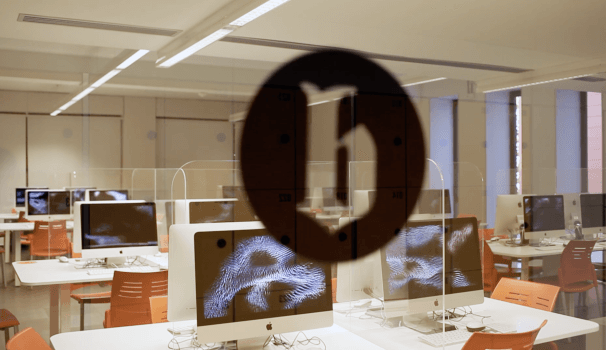
If you have a job or just need a computer, you can go to the computer classrooms or workspaces and use the Macs we have at your disposal.
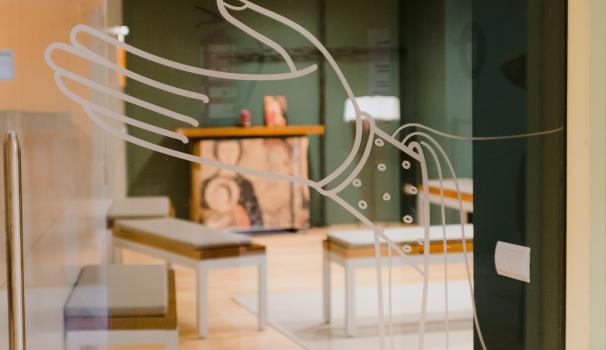
The chapel is the right place to find recollection, peace, to focus, to pray and to celebrate the Eucharist weekly and at important liturgical moments (Christmas, Ash Wednesday and Easter). The sacrament of reconciliation is also celebrated.

Using the latest equipment and audio-visual techniques is part of the learning process and enables students to enter the world of work with a broad knowledge of computer science. For this reason, the schools are equipped with audio-visual material for viewing and editing and a video library.

Ets estudiant o Alumni dels graus en Comunicació o del Grau en Relacions Internacionlals i tens un projecte que requereix equipament tecnològic i assessorament professional? Posem a la teva disposició el programa de mentoring, un servei per donar suport tecnològic i assessorament a aquests projectes.
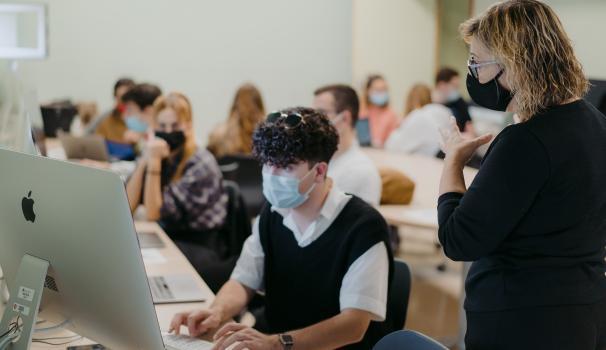
Our facilities include Mac computers, state-of-the-art software, WiFi network and printers to provide students with all the materials they need in their learning process.

Ethics in the field of research is fundamental. The Faculty Research Institutes are supported by the opinions of the Research Ethics Committees (CER-URL) to evaluate and rate projects that have ethical implications.
If you are part of a research group, a professor or a PhD student and you need help with a project, you can ask for advice. This assistance includes analysis, guidance, help with applying for awards, and the financial management of projects.
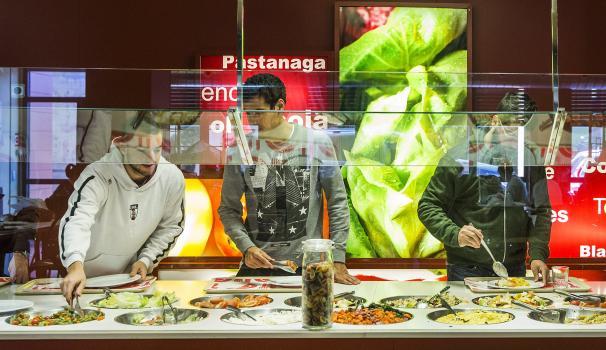
The nerve center of the quintessential faculties is the bar. There, teachers, students and staff meet throughout the day for breaks or meals.
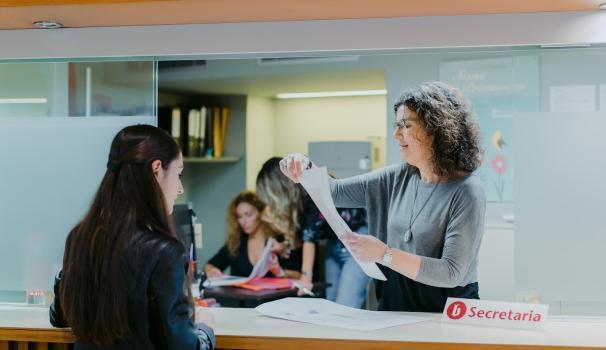
The Academic Secretaries of the Blanquerna faculties are the space for students to relate to the processes linked to the registration of official and own courses.

Would you like to receive information on pre-registration and admissions processes, scholarships and grants or validations? The SIOE is the service you need. Ask for all the information about any of these processes and discover all the possibilities at your fingertips.
Professional experience is a core part of our methodology. For this reason, we have a broad spectrum of internship agreements to meet the needs and preferences of all students. You will graduate having worked in your industry.

At Blanquerna, we put the future within everyone's reach thanks to our scholarships and grant service to start or continue studying at our schools. Financial aid is both internal and external to the university. You will find a wide range of possibilities.
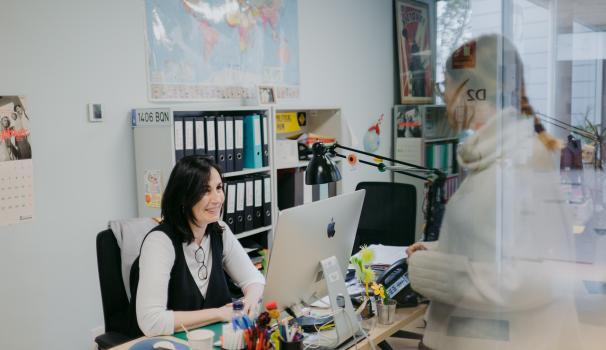
Going abroad is a unique opportunity to discover the plurality of the world. Aware of the importance of the internationalization of studies, we have established mobility agreements around the world.
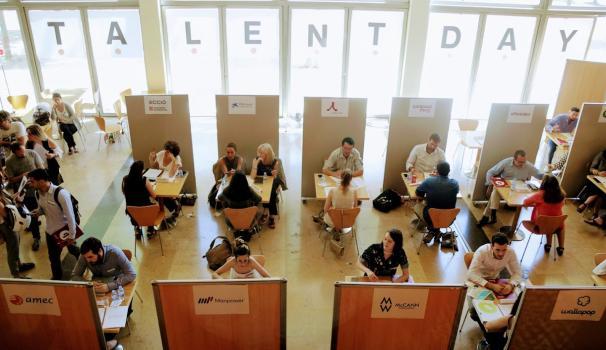
This service provides graduates with the necessary means so that they can actively participate in their professionalism and propose optimal candidates to organizations and companies looking for staff.

The leap into the world of work is always a challenge. For this reason, we provide a Job Bank for students and graduates. This service puts students in touch with companies and institutions looking for staff.
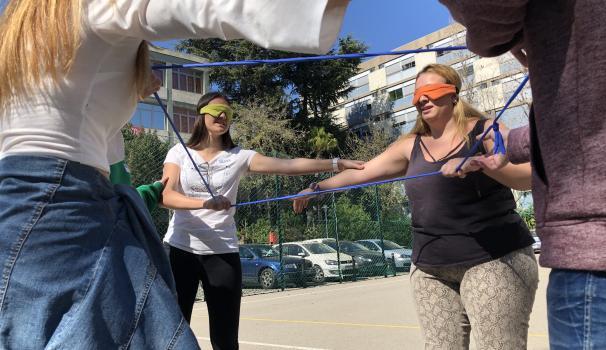
Solidarity and the struggle for human dignity are values that identify us. Solidarity Action is a volunteer program that our students can join to participate in projects in the Third and Fourth World.
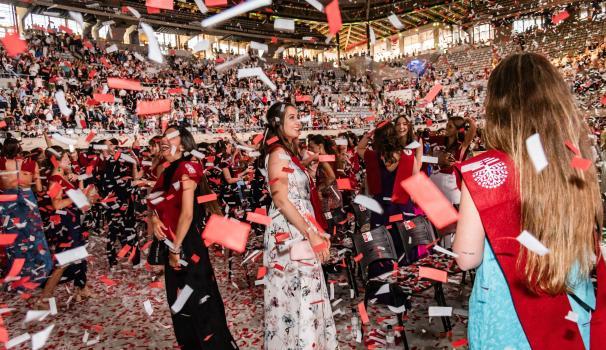
Studying in Blanquerna allows you to be part of our community. Being a college student opens the door to a lot of options for continuing your vocational training beyond your time in the classroom.
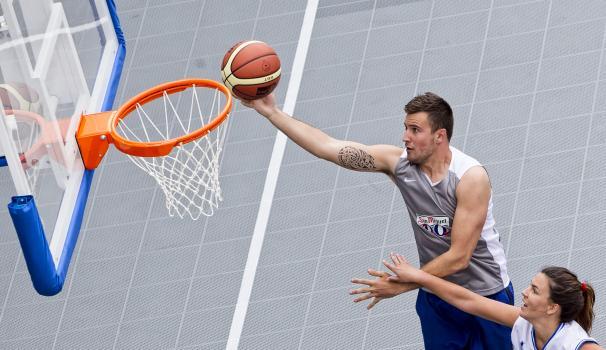
Want to represent the URL in college sports tournaments? You can find a wide range of possibilities for both individual and team sports. To be a student of Blanquerna, you will have a discount at the Can Caralleu and La Salle Sport & Fitness sports complexes.

If you are in a difficult situation in the academic, personal or social field, you can request, free of charge, the personalized attention of the SOP. This is an interdisciplinary team of professionals who will guide you in dealing with the situation.
In the three Blanquerna faculties, you will find spaces for reflection isolated from the hustle and bustle dedicated to the celebration of the Faith or cultural and religious animation. If you wish, you can also receive personalized attention and information about church life.
At Blanquerna we promote personal development at all levels to people with a diversity of specific needs from a normalizing context that encourages personal autonomy and uniqueness.
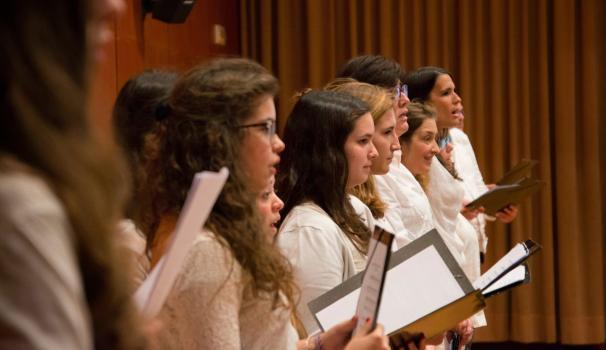
If you like music and want to take part in the concerts of institutional events and festivities, sign up for the Blanquerna Choir. There you will meet new friends and enjoy music.
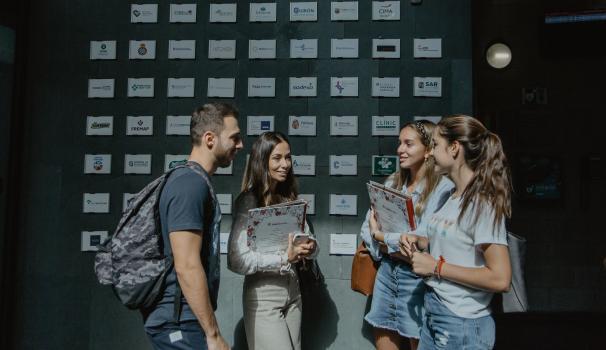
Each class group must elect a representative to put forward concerns or make proposals to the faculty members and academic management. At the same time, each degree must appoint a delegate and each school a representative on the general URL council.
Contact between students and the university is constant and is channeled through the Student Council, the body that collects proposals and requests from students and facilitates university life.

Are you studying a foreign language and want to improve your level? Do it at your own pace in the language self-learning classroom. This service offers various teaching resources and materials to practice the language.

We’re here to listen! Have you experienced or witnessed any situation of harassment? Do you have any questions about Blanquerna’s equality policy? Would you like to make a proposal or suggestion regarding gender issues? Use this Anti-harassment Point: write to us through the channels you’ll find at the bottom of this page.
Onno Gerard Hubert Seroo
Mercè Kirchner Baliu
Mariona LLoret Rodà
Xavi Martí González
Asya Abdulhafiz Nasrula
Raghida Abillamaa Hamouche
Javier Albarracin Corredor
Diana Al-Rahmoun Font
Inés Arco Escriche
Gema Aubarell Solduga
Anna Ballesteros Peiro
Jordi Baltà Portolés
Serena Rachel Barkham
Saiba Bayo Diamba
Valeria Bello
Ignasi Boada Sanmartín
Moussa Bourekba
Jorge Calvo Rufanges
Judith Calzada Duaigües
Blanca Camps Febrer
Albert Caramés Boada
Esteve Carames Boada
Gabriela Carrera Scotton
Ruben Carrillo Martin
Antoni Castells Talens
Craig Christopher Collins
Marc Compte Pujol
Sergi Cutillas Marquez
Míriam Díez Bosch
Roger Esteban Mondaray
Carles Fernandez Torne
Agustín Fernández de Losada Passols
David Ferré Gispets
Pere Franch Puig
Miguel Franquet Dos Santos Silva
Xiangjun Gong
Federico Guerrero Cabrera
Hiba Hassan
Raja Hassan Garbo
Alexander Heichlinger
Amadeo-Koichi Jensana Tanehashi
Jaume Lopez Hernandez
Tianling Lu
Elizabeth Mathilde Marie
Oriol Massegú Blanch
Oscar Mateos Martin
PILARMS Muro Sans
Pilar Navarro Muñoz
Marie-Hélène Nuc
Roger Pallarés Sastre
Estelle Sylvie Pautel
Alejandro Pozo Marín
Eva Maria Prada Garrido
Zhihang Qin
Alba Ramírez Pagès
Raül Romeva Rueda
Claudia Saba
Alba Sabaté Gauxachs
Laura Salzano
Enrique Schonberg-Schwarz Letzen
Jordi Serra del Pino
Jaume Suau Martínez
Andreu Torner Jolonch
Jordi Urgell Garcia
Lourdes Vidal Bertran
Aurelia Anne Katia Volsy
Ursula Frances Wolf
Klaus Zilles
The Blanquerna-URL School of Communication and International Relations, well aware of the European scope of the studies it offers, has presented various projects in the field of internationalization since the 1997–1998 academic year, including mobility programs for students in the fourth year of the bachelor's degrees in Communication and Global Communication Management, and third-year students of International Relations, and the exchange program for professors and administrative staff.
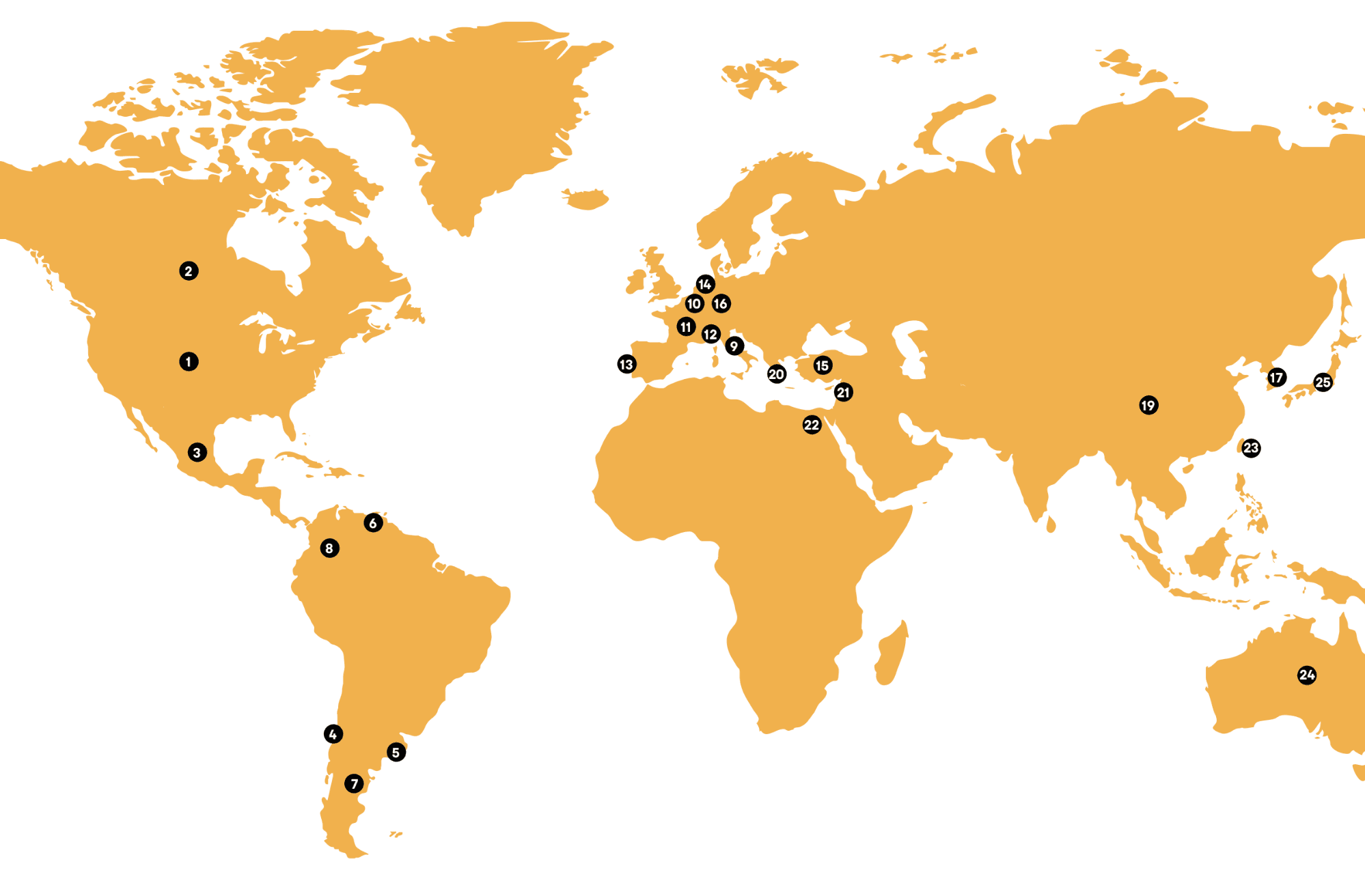
The application process for a place in the 2026-2027 academic year is now open and consists of three phases:
The application for a place can be made online or in person and entitles the applicant to participate in the admission process.
It can be done via the Application for admission button on the page for each degree, or directly from here, and requires:
It can be done at the School itself, by going to the Student Information and Guidance Service (SIOE), and the following must be submitted:
Approximately within two working days after the place application, the student will be informed by email about their admission. If admitted, the same message will invite them to formalize enrollment, including instructions on when and how to complete the procedure.
The criterion used to call admitted students to formalize enrollment will be the order of payment of the place application. For degrees with more than one shift, note that a shift may fill up during the enrollment period. The place will be definitive once the student has submitted the documentation with the final university entrance information and the first enrollment payment has been made.
For degrees taught in English, students must demonstrate a minimum B2 level of English to be admitted. The level can be accredited through the level test that all degree students must take before starting their program. To prove the minimum level, an official language certificate of B2 or higher can also be submitted: IELTS (6-7), TOEFL (IBT 90-110), CAMBRIDGE, or Official Language Schools, obtained within the last two years. Certificates from other organizations will not be accepted. The certificate does not exempt students from taking the level test to determine the English level for the first year.
It is the student's responsibility to have a level equivalent to B2 in the language of instruction of the degree to properly follow classes
The student called to enroll may choose between two options, depending on whether they already have the definitive entrance pathway or not.
Enrollment in the degree can be formalized before passing the PAU (University Entrance Exams) or CFGS or having the entrance pathway. Enrollment will be conditional on the presentation of the corresponding admission pathway. This option secures the place and allows choosing the shift, in the case of degrees with more than one shift, while places are available.
If the student does not obtain the entrance pathway, the enrollment fee will be refunded, but they will lose the place, preference in shift selection, and the amount paid for the place application (€50). If places remain available in July, they may choose to stay on the waiting list until September, and the money will be held, but they will no longer have preference for shift selection. If they do not obtain the entrance pathway by September, the enrollment fee paid will be refunded.
It will be formalized if, at the time of processing the enrollment, the student already has the university entrance pathway. They may opt for the available places and shifts.
IMPORTANT: Degrees with more than one shift may exhaust places in a specific schedule with conditional enrollment. The required documentation must be uploaded via the Document Repository.
The place will be definitive once the student has submitted the documentation with the final university entrance information and the first enrollment payment has been made.
NOTE: Students in the Communication Degrees must take an English level test that will not be exclusionary for admission but will determine the level at which they start the first year. Each student will be informed of the test date and time by email.
Studies can be paid upfront and/or in interest-free installments. If payment by installment is selected, upon enrollment the student will have two business days to pay 50% of the total cost of the enrolled credits, using their chosen form of payment; this payment will not be taken by direct debit. The remaining 50% will be divided into nine monthly payments from October to June via bank direct debit from the account provided at the time of enrollment. Prices for each academic year are updated annually.
Once payment is made, the corresponding receipt of enrollment can be viewed in the student's Document Repository and via the student's portal.
For the foreign student admission process, the following considerations and requirements must be taken into account in accordance with the prevailing regulations.
Students must apply to the Universidad Nacional de Educación a Distancia (UNED) to obtain the credential certifying that they meet the requirements to access university studies within the state education system (UNED Credential). Therefore, they do not need to take the PAU (University Entrance Exams), but without the mentioned credential, they cannot enroll in our degrees.
The education systems that can be accessed through this pathway are: Germany, Andorra, Austria, European Schools (European baccalaureate), International Baccalaureate, Belgium, Bulgaria, Croatia, Denmark, Slovakia, Slovenia, Estonia, Finland, France, Greece, Hungary, Ireland, Iceland, Italy, Latvia, Liechtenstein, Lithuania, Luxembourg, Malta, Norway, the Netherlands, Poland, Portugal, the United Kingdom, the Czech Republic, Romania, Sweden, Switzerland, China and Cyprus.
These students may access our degrees by submitting the homologation of the High School diploma from the Spanish Ministry of Education or from the autonomous communities with transferred competence, such as the Generalitat de Catalunya. Proof of application for convalidation will be sufficient for students to enroll and begin taking a bachelor's degree course, however full enrollment is conditional on convalidation being confirmed. Bear in mind that convalidating studies can take more than three months to complete, so this process should be done in parallel with the admissions process to our bachelor's degrees. If the convalidation resolution is not obtained in the terms requested by the interested party, the results of any exams taken, or the enrollment made as a result thereof, are rendered null and void.
For any questions or inquiries about the place application or enrollment process, contact [email protected]
The Blanquerna Bachelor's Degree in International Relations (GRIN) curriculum requires students to complete a thesis, designed as a course taken in the fourth year of the program. This thesis constitutes in itself a key instrument in the student's education, which has to allow them to integrate the learning acquired throughout the degree, to delve into the various areas of knowledge of international relations, to assume its transdisciplinarity, as well as to develop discursive and argumentative skills, critical analysis, use of sources of information and documentation, communication, initiative and autonomy.
The thesis is linked to a methodological seminar, the design and content of which includes the systematization of a set of specific skills and knowledge to be applied to the project. At the same time, each thesis has an associated undergraduate professor who will act as an advisor and whose role will be to support the student in the correct development of the project.
GRIN students will have to choose one of these two thesis methods: research project and professional or applied project, both on a topic within one of the areas of knowledge of international relations. The first will have to be done individually, while the second modality can be done in a team (of 2 people maximum) or individually. In the case of teamwork, the relevance and suitability of doing it in pairs must be reasonably justified, the prior acceptance of which by the GRIN coordination will be necessary to carry out the proposal.
The project must be written in English .
Students will prepare a proposal covering the following areas: project type (research/professional or practical application), project title, justification for the chosen topic, and a brief explanatory summary of the topic to be developed, clearly specifying the general and specific objectives of the work proposal. Once the proposal has been submitted, the bachelor's degree coordination team will assign an advisor to each thesis, whose role is to guide and support the student throughout the development of the project.
The thesis will be written according to the chosen project method. In both cases, this phase is structured based on a series of assessable activities that the student will have to submit within the established deadlines. These submission dates are scheduled for the second semester of the fourth year, which is when the project will be formally developed.
Once the final report has been submitted, the student will have to defend the thesis before an ad hoc panel comprising two people, all of them GRIN professors, not including the advisor. One of the members of the panel will act as chairperson, responsible for presenting and moderating the proceedings, as well as signing the assessment report. In exceptional circumstances, the coordination team may invite external persons, experts in the field of study of the thesis in question, to participate as members of the panel, in place of the professors.
The final grade for the thesis comprises two main parts: the result of the activities carried out in the development phase and that of the oral defense phase.
Find the help that best suits your needs between Blanquerna scholarships and grants, public and private grants or funding grants.
Blanquerna-URL is waiting for you!
External internships at companies and institutions are a key part of the learning process. They are the student's initial direct contact with the professional world where they will be able to apply the knowledge gained at university. The School has agreements with upwards of 500 companies where students are prepared to face the working world.
· Action Against Hunger · Aerolink Air Services S.L. · Agència Catalana de Cooperació al Desenvolupament · AMEC · Spanish Chamber of Commerce in the Philippines · Sabadell Chamber of Commerce · CAN Europe · Casa Africa · Casa Amèrica Catalunya · Casa Asia · Center for Cooperation in the Mediterranean · Centre Delàs d’Estudis per la Pau · Centre Internacional Escarré per les Minories Ètniques i Nacionals (CIEMEN) · CIDOB · · UCLG United Cities and Local Governments · Consell Català del Moviment Europeu · Spanish Red Cross in Catalonia · Deloitte · Department of Foreign Affairs - Generalitat de Catalunya · Department of the Interior - Generalitat de Catalunya · Department of the Presidency - Generalitat de Catalunya · Eupportunity · Fundació Futbol Club Barcelona · GEA Barcelona European Consulting · Global Socio Economic Forum Secretariat · Gomplast · Havas Media · IEMed · European Institute of the Mediterranean · Instrategies · International Policy Sector Action Plan · ISGlobal · Justicia i Pau · Kreab Iberia · Media Planning Group · Metropolis · Mola Mola Surf S.A. · MSA The Safety Company · Network of Regional Governments for Sustainable Development · ORU FOGAR · Otaduy · Oxfam Intermón · Parlament de Catalunya · PEN International · PIMEC · Ramon Clemente S.A. · SPAMEX - Associación Instituto Iberoamericano de Mobilidad Internacional · Thomas Cook International AG · Tornos Abogados · Tous · UNICEF - Catalonia Committee · Zicla
There are two types of external internships: curricular and extracurricular.
Curricular internships are those that form part of our curriculum: they are taken in parallel to seminar VII during the first semester of the fourth year. The seminar VII professor is the advisor who will supervise the evolution of the student in their internships and guide them throughout the process. In the company, students will also have an advisor appointed by the center who will supervise their learning.
Extracurricular internships are all others that the student can do electively outside the curriculum, although they also have an exclusively training and teaching purpose and will therefore be included in the European Diploma Supplement (EDS). In all cases, the internship must be compatible with the student's class hours. Internships may or may not be remunerated, depending on the company or institution.
In the following link you will find the program of the curricular internships.
On the Bachelor's Degree in International Relations, students also have the option of doing their curricular internship abroad through various agreements with companies, organizations and institutions.
The curricular and extracurricular internships are regulated by point 17 of the school's academic regulations.
The student's advisor in the school will provide students with the criteria to follow to successfully pass the internship course and the parameters for drawing up the internship report. Here is the guide to writing the report.
This must be done by contacting the School Internship Service.
Degree follow-up reports
Center follow-up report
Student surveys
Faculty surveys (research and teaching staff)
Administrative and service staff surveys
Evidence relating to employer satisfaction
Job bank and careers
URL Student mobility
As the European Union points out, gender equality is not only a matter of social justice but also affects the results of teaching and research. Promoting gender equality in research and innovation is one of the European Commission's commitments, and it supports the explicit integration of a gender perspective in Horizon 2020 projects. However, this recommendation is often poorly understood and misapplied. Various documents are presented here with a view to contributing to a better understanding and application of the gender perspective in teaching and research.
RELATED PROGRAMS
We equip you for change




